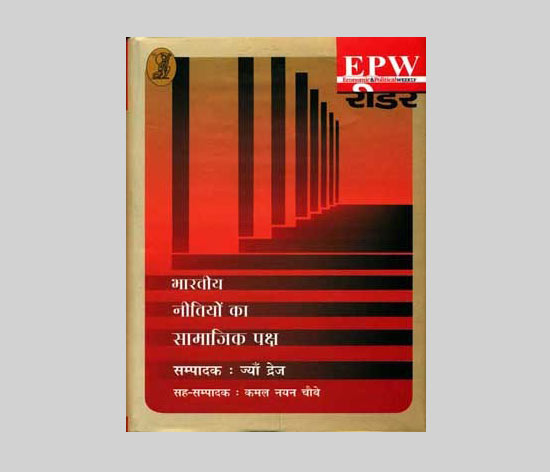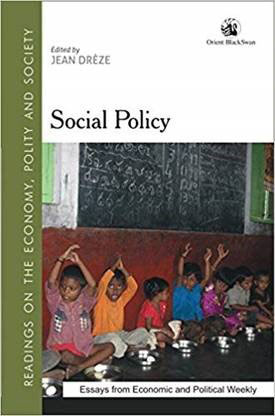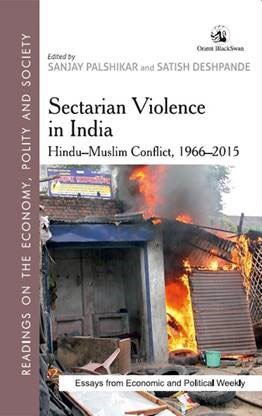
Regarded as the only journal in the world to publish a weekly analysis of contemporary affairs alongside academic papers in social science, the Economic and Political Weekly turned 50 in 2016. Established in 1949 as The Economic Weekly and rechristened (under Sameeksha Trust) as the Economic and Political Weekly (EPW) in 1966, the publication holds a special place in the intellectual history of independent India for more than five decades. The unique form of the weekly journal has brought together academics, political scientists, researchers, policy makers, NGOs and independent thinkers for debates spanning economics, sociology, culture, politics and numerous other disciplines.
In 2015, Sameeksha Trust, publishers of EPW, with the support of the Tata Trusts, set up a project to disseminate a selection of research from their archive in three different but related ways to the academic community and wider public.
Publishing nine readers (including three Hindi translations) was the first component, out of which four readers in English, and two readers in Hindi have already been published1. Covering a range of topics like social policy, water and sectarian violence, the intention of these readers “is to make available to the contemporary reader a handy compendium of social science research and commentary published over several decades in EPW"2 . The effort involved in putting these readers together was largely an editorial assignment, where selection and deletion decisions played key roles and reflected on EPW’s archive management and digitisation practices as well. All the articles that make up the readers are available on EPW’s website.
 |
| Cover of EPW Reader 'Social Policy' Ed. Prof Jean Dreze, 2016 |
The second component was to publish a three-volume set chronicling The Economic Weekly’s and EPW’s work from 1949 to 2017 with a set of articles from their archives on ‘history’. Covering a larger period as opposed to the readers, these publications will be less specialised and will also target the lay reader. The volumes are currently under production, with the biggest challenges being faced by the editors being that of selecting from the voluminous archive articles that best represent a historical timeline of India’s political, social and economic climate since Independence. The first volume will account for essays from 1949 to 1965, edited by Professors Pranab Bardhan, Sudipto Mundle and Rohini Somanathan; the second from 1966 to 1991, edited by Professors Gurpreet Mahajan, Ila Patnaik and Surinder Jodhka; whilst the third from 1991 to 2016, edited by Professors Suhas Palshiker, Pulapre Balakrishnan and Nandini Sundar. An intended outcome of the publication is to not only demonstrate the vastness of EPW’s archives, but more importantly provide a consolidated resource of academic-cum-detailed journalistic writing on a large part of post-independent India’s history.
 |
| Cover of EPW Reader ‘Sectarian Violence in India-Hindu-Muslim conflict, 1966-2015’ – Ed. Profs Sanjay Palshikar and Satish Deshpande, 2019 |
EPW’s efforts towards disseminating information from its archive in these myriad ways highlights a key fact about the weekly journal — its commitment to present sustained analysis on India’s contemporary issues across the social sciences. The standard of academic excellence practiced by EPW can be witnessed in these readers and a testimony to their continued pedagogic role can be seen in ‘50 Years of EPW’. The long-term outcomes of this documentation project will include creating a pool of critical resource for students, academicians and researchers and a wider dissemination of academically sound and thoroughly researched articles.
— Arnab Banerjee and Paroma Sadhana
1Readers: ‘Social Policy’ – Editor Prof Jean Dreze; ‘Water’ – Editors Dr PS Vijayshankar and Dr Mhir Shah; ‘A Handbook on Rural India’ – Editor Prof Surinder Jodhka; ‘Sectarian Violence in India: Hindu-Muslim Conflict, 1966-2015’ – Editors, Professors Sanjay Palshikar and Satish Deshpande; ‘Gender, Equity and Education’ – Editor Dr Vimala Ramachandran. ‘Social Policy’ & ‘A Handbook on Rural India’ – Hindi translation by Vani Prakashan, New Delhi.
2Note to the reader: ‘Sectarian Violence in India: Hindu-Muslim Conflict, 1966-2015’ – Editors Prof Sanjay Palshikar and Satish Deshpande, Orient Blackswan Pvt Ltd and EPW, 2019
